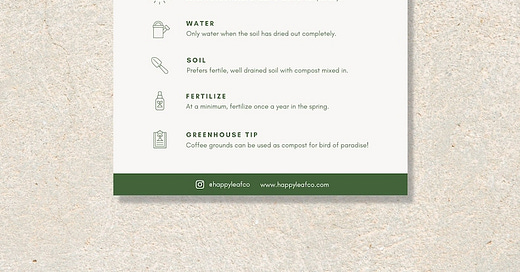Things I learnt from a houseplant label
Don't let the 'self care' industry bamboozle you: it's actually very simple
Every day we make thousands of choices: what time shall I get up, what shall I have for breakfast, shall I wash my hair, shall I wear these shoes, shall I discuss this slightly sensitive topic with my husband/child/mother about [insert any known number of things], shall I read this, shall I do that, shall I go there, shall I text this person, take this job? You get the picture.
One of the things we have to decide about is how we take care of ourselves. And this is where, I have noticed, we often fall down. Looking after ourselves in a gentle, kind and compassionate way is often the last thing on the ever-growing to-do list. We look after our pets and our plants better than we look after ourselves: I see houseplants getting more attention than my friends give themselves on a weekly basis. ‘Ooh, he needs a little water, and I like to turn him just a quarter turn once a week, so he gets just the right balance of light,’ — this from a friend. (‘He’ refers to her favourite money tree plant, of course, keep up.) Pets are lavished with organic food sourced from Somerset farms. I mean, I exaggerate, but only a bit.
As Ellie Violet Bramley writes in this article in The Guardian — why has self-care has been packaged as an out-of-reach, hard-to-achieve, expensive thing which just gets added to the to-do list, piling on more stress? As she says in the piece,
If you have ever got out of a bath or left a yoga class more stressed than you were beforehand, you will intuitively understand the concept of faux self-care. In the Goop era in which we live, everything from journals to air purifiers, crystal jewellery to “poop stools” can be packaged up and sold as the answer to stress, burnout and depression, a way for women – because all this is by and large targeted at women – to become their best selves. But, all too often, this is making us feel worse, not better.
Why has ‘self-care’ become commodified, synonomous with products and experiences that are deemed to be uneccessary, expensive or faintly ridiculous, when in fact self-care can be anything that means you put a boundary around your own time, your wellbeing, and what makes you happier? This could be as simple as choosing to not spend time with a toxic family member, or deciding stay in because you need a night at home resting from a busy week, or it could be having a bubble bath or doing a yoga class. Whatever makes you feel good, frankly: it’s about feeling better, and choosing the joy. We need to look after ourselves in the same way that we care for the money trees, spider plants and furry friends in our lives.
We should each be building a toolkit of things that make us feel good — or ideally a Mary-Poppins-sized carpet bag — full of self-care tips and tricks designed to make us feel better, happier, cosier, calmer. From staying in, to reading a good book, to seeing one friend, to sitting and stroking the cat, to ringing an old friend, to having a bath if that’s what you want, to meditating, to going for a run, to walking to the shop to buy a giant Snickers, or to having a massage. Whatever floats your boat. Just don’t feel guilty about it, or complicate it more than that. Self-care is a radical act. It doesn’t need to cost money. But you do need to put yourself first for five minutes. And lots of us are not very good at that.
I wish that, rather like a houseplant, we each came with a little ‘Instructions for care’ label. Ideally it would read something like this:
Ensure this human gets good sleep, spends time with people they love, drinks water, learns to manage their stress, has good friends to talk to, sets healthy boundaries, gets some exercise outside in nature and eats as healthily as possible. Make sure your human nourishes their mind and body, and puts themselves first once in a while.
It doesn’t feel too much to ask does it? Start by making small choices that make you feel better. And don’t be afraid or reluctant to care for yourself, whatever that looks like for you. Meaningful self-care, boundaries and just chilling out about it all can be massively beneficial. What’s more, your houseplants will be just fine if you forget to water them for a week. Nurture your own roots instead.
Liz




